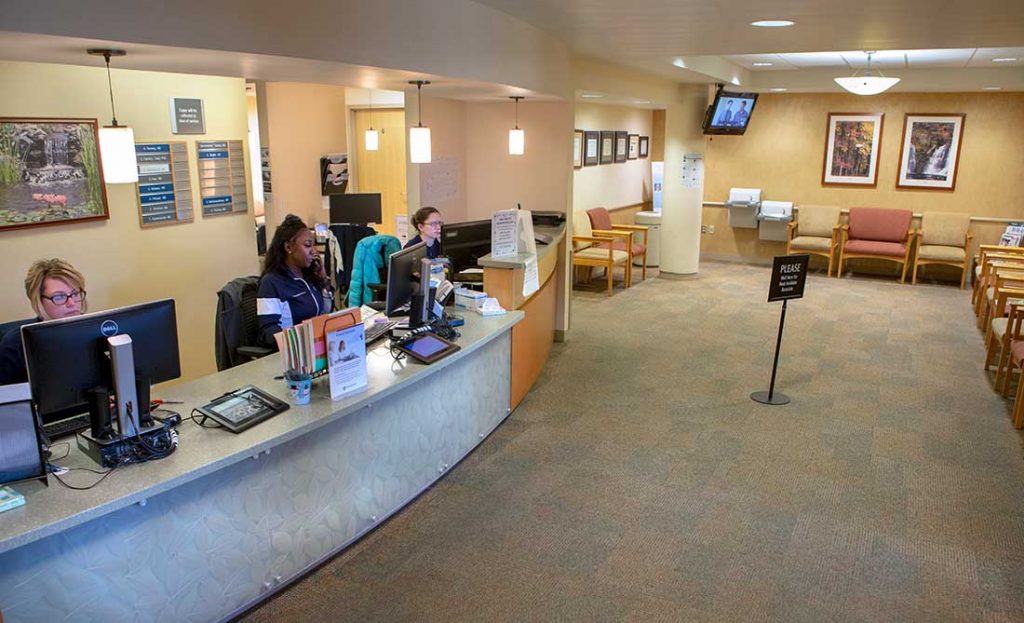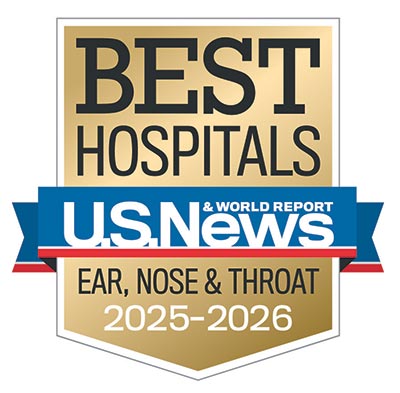Facial Nerve Disorders Clinic Takes a Multidisciplinary Approach
Dr. Jessyka Lighthall launched the multidisciplinary Penn State Facial Nerve Disorders Clinic a little more than two years ago, after realizing that many patients with facial weakness, paralysis or abnormal movement are unaware that anything can be done to help them. Often, these patients are misdiagnosed, she said, delaying crucial treatment to help them regain facial function, motion and symmetry.
Lighthall is an assistant professor of surgery in the Division of Otolaryngology – Head and Neck Surgery, director of facial plastic and reconstructive surgery and founder and co-director of the Facial Nerve Disorders Clinic at Penn State Health Milton S. Hershey Medical Center.
Lighthall’s co-director of the clinic is Dr. Donald Mackay, the William P. Graham III Professor of Plastic Surgery, a professor of surgery and pediatrics, chief of the Division of Plastic Surgery and vice chair of the Department of Surgery.
The two surgeons direct a core team that provides medical management, surgery, facial rehabilitation and speech language pathology to patients. In addition, adult and pediatric neurologists, neurosurgeons, neurotologists, ophthalmologists, head and neck oncologists and infectious disease specialists work on cases as needed at the clinic, which operates two Fridays per month at the Penn State Neuroscience Institute.
“These patients are very complex, so we found a location where we can pull in providers from multiple different avenues and subspecialties to take care of them,” Lighthall said. “It’s really a place where you can be holistically treated.”
Facial never disorders can be caused by injury, surgery or disease. Many patients are told they have Bell’s palsy, a nonspecific diagnosis that’s often treated with little more than watchful waiting. Regardless of whether a patient was recently diagnosed or has been living with a facial nerve disorder for some time — even a lifetime — Lighthall’s team works to determine the underlying cause, which can include congenital paralysis, Lyme disease, trauma, stroke or a benign or malignant tumor, among other conditions.

Facial Nerve Disorders Clinic provides holistic treatment to patients with facial weakness and paralysis.
“You don’t want to miss some of these more intense, serious diagnoses,” she said, pointing out that a missed parotid gland cancer, for example, could be fatal.
Aside from recognizing the underlying cause, it’s important to treat facial weakness and paralysis because they’re extremely detrimental to facial function. They can cause difficulties with eye and mouth closure, leading to vision loss, eye dryness, drooling and problems with speech and swallowing. Some patients may even experience breathing problems if the paralysis affects the position of the nose.
These issues can severely impact quality of life, Lighthall said. Many patients become socially isolated and experience depression.
At the clinic, patients may regain symmetry and/or motion with techniques including Botox; eyelid, brow or facelifts; and facial rehabilitation.
The clinic’s two specially trained facial rehabilitation specialists are a unique offering. Most physical therapists do not know how to do appropriate facial rehabilitation for patients with facial weakness, according to Lighthall, sometimes prescribing treatments that may worsen recovery. “So it’s really important to have therapists who know how to treat these types of patients in every way,” she said.
Other patients who are recovering facial motion will either not recover completely or will develop abnormal facial spasms and movements that can be just as bad as or worse than the initial weakness. These patients may need therapies such as selectively weakening the abnormally moving muscles so patients can learn to control them.
For patients who don’t recover fully or at all from facial weakness or paralysis, the clinic performs advanced surgical techniques such as nerve grafts and muscle transfers. In one technique, gold or platinum weights are implanted in the upper eyelid to keep a perpetually open eye closed.
Lighthall also sees patients with both cosmetic and functional problems at Penn State Health’s Division of Otolaryngology ― Head and Neck Surgery/Pediatric Surgery and at Esteem Penn State Health Cosmetic Associates. She also performs surgical mission trips abroad for cleft lip and pallet reconstruction and head and neck facial trauma surgery.
She plans to start a research arm of the facial nerve disorders clinic to look at how the treatments provided there affect function and quality of life.

Jessyka G. Lighthall, MD
Chief, Division of Facial Plastic and Reconstructive Surgery
Director, Facial Nerve Disorders Clinic
Medical Director, Esteem Penn State Health Cosmetic Associates
Associate Professor, Department of Otolaryngology-Head & Neck Surgery
Phone: 717-531-6822
Email: jlighthall@pennstatehealth.psu.edu
Fellowship: Surgery, facial plastic and reconstructive, University of Minnesota Hospitals and Clinics, Minneapolis, Minn.
Residency: Surgery, otolaryngology, Oregon Health Sciences University, Portland, Ore.
Medical School: Oregon Health Sciences University School of Medicine, Portland, Ore.
Connect with Jessyka G. Lighthall, MD, on Doximity

